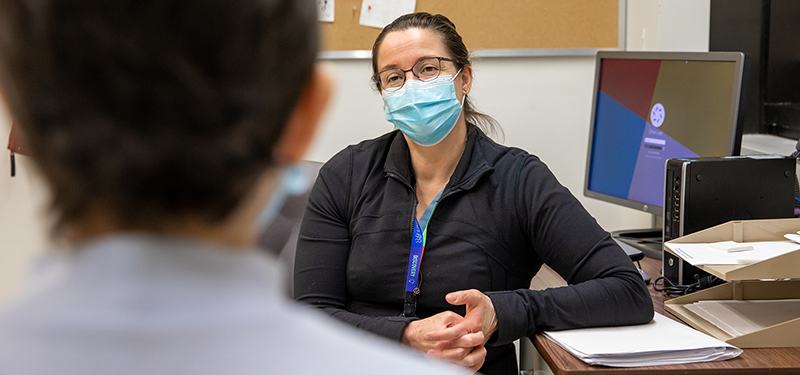
“There is a real connection you have with patients. They allow you to operate on them to make them better. It moves you that they give you that trust,” says Dr. Erin Kennedy, a surgical oncologist at Mount Sinai Hospital’s Cancer Program, who specializes in colorectal cancer and inflammatory bowel disease (IBD).
“With that trust, there is also great responsibility.” For Dr. Kennedy, that responsibility is to look to newer evidence to further tailor treatment and listen to patients to understand their preferences.
“It’s about what patients think is important – not just what clinicians think is important.”
She is leading research to rethink more targeted approaches to lower the potential of complications and impact on quality of life and avoid overtreatment.
A senior clinician scientist at Lunenfeld-Tanenbaum Research Institute, she is conducting a study to look at non-surgical options for patients with locally advanced, low rectal cancer. Standard treatment is chemotherapy and radiotherapy (CRT) followed by surgery. “The idea is to defer surgery for patients where there is no residual tumour after CRT, which occurs in about 30 per cent of patients,” says Dr. Kennedy. Patients have expressed a strong preference to defer surgery that involves a stoma (an artificial opening) which can have long term effects.
“Conducting research to effect practice change is particularly meaningful to me because it means better care,” says Dr. Kennedy, who is also Mount Sinai Hospital’s Division Head of General Surgery.
She has also led greater team-based discussions related to patients with Stage II and III rectal cancer. Working with pathologists, radiologists, medical oncologists and radiation oncologists, they looked at the use of MRI (magnetic resonance imaging) Synoptic reporting to enhance tailored care. In a study with 82 patients, the team from 10 Centres across Canada used MRI criteria to identify, before treatment, patients at lower risk of disease recurrence who would benefit from surgery alone. “Consistent with the literature, we found patients value how treatments may affect function as much as how the cancer is controlled,” she says. MRI Synoptic reporting for patients with rectal cancer is standard in Ontario and is being nationally implemented, and adopted in the U.S.
“We are listening and providing personalized approaches to improve quality of life. It is a privilege to have those special relationships with patients and to work with them in this way,” she says.
The Colorectal Cancer program, part of the Christopher Sharp Cancer Centre is the only program in Ontario offering comprehensive colorectal cancer care from screening, diagnosis and treatment of early stage, recurrent and advanced disease, to supportive care and psychosocial services.
In her role as Patient Engagement Lead for Best Practice in Surgery in the Department of Surgery at the University of Toronto, Dr. Kennedy met with patients and surgeons to look at ways to improve surgical care. “Patients identified a need to better understand whether symptoms they were experiencing were in the norm, after leaving the hospital,” she says.
She led a team that developed an integrated discharge monitoring system to support patients at Mount Sinai Hospital in their recovery at home after colorectal surgery. The pilot showed high patient satisfaction and contributed to a 60 per cent decrease in 30-day hospital re-admission rates.
